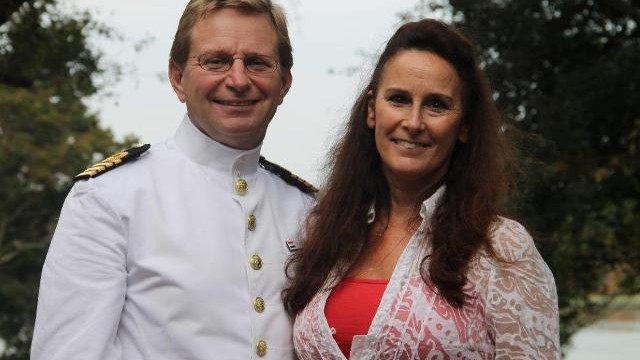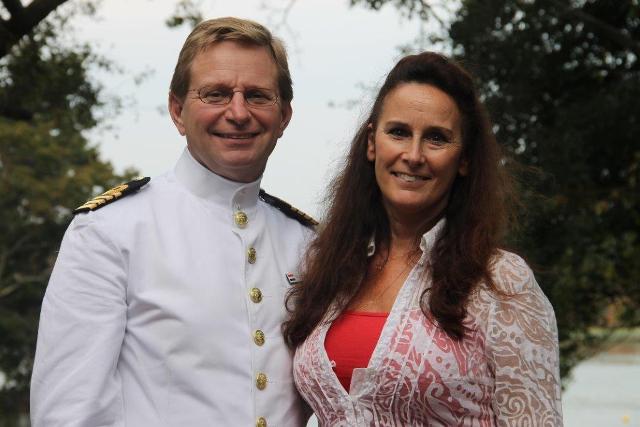
CAPT Maarten Lutje Schipholt MSc, National Liaison Representative of The Netherlands to Supreme Allied Command Transformation in Norfolk, with his wife, Edith.
By Jeff Maisey
Last year, according to CAPT Maarten Lutje Schipholt, National Liaison Representative of The Netherlands to Supreme Allied Command Transformation in Norfolk, Kareem Chun, a Dutch student working at NATO ACT headquarters, looked at the broader impact of rising sea levels for the Hampton Roads area and came up with the following conclusions:
- The US is not adequately prepared to deal with natural disasters, and climate change will make catastrophic disasters and flooding worse.
- The National Flood Insurance Program (NFIP) provides perverse incentives for people to live and work in high-risk areas
- The American system focuses on disaster relieve instead of flood control and prevention
- The Netherlands is a global leader in flood management solutions and can offer lessons for the US
- The Dutch approach can help America to cost effectively target risky areas through implementing primary hard and secondary natural defense systems
- Dutch rational levee safety standards, innovative coastal line sand nourishments, ‘Room for the river’ and ‘Underground storage of water runoff’ concepts should be prioritized in areas in the US.
Maarten Lutje Schipholt hails originally from the ancient Dutch city of Haarlem. Since attending the Royal Netherlands Navy Institute in 1977, he has had a distinguished career that included Staff Course at the NATO Defense College in Rome. His mission while serving in Norfolk is to create better awareness of Allied Command of Transformation (ACT) within the Netherlands, and a better exchange of information between ACT and The Netherlands as well as partner NLRs.
The role of NATO ACT in Norfolk is to prepare and plan for the collective defense needs of the future in various realms such as cyber defense and weapons systems training. Strategic objectives are 1) Provide appropriate support to NATO missions and operations, 2) Lead NATO military transformation and 3) Improve relationships, interaction and practical cooperation with partners, nations and international organizations.
I recently sat down with Captain Maarten Lutje Schipholt to get his views on climate change, rising sea levels, and to see what Norfolk might learn from the Dutch experience in its centuries-old fight against the sea.
Over the centuries, your nation has battled the sea and managed rising water levels. When you look at Virginia’s coastal areas, how do you assess our situation?
First, I’m not an expert on rising sea levels, but of course we have a lot of experience being Dutch with fighting the sea. We have always been a sea going nation. So we have a lot of expertise and knowledge. We also have an MOU (Memorandum of Understanding) with the United States to share information. We’ve helped you out with Katrina and Sandy.
How to assess the situation? Well that is a challenge. When I participated with a seminar with LEAD Hampton Roads the other week it appeared to me that in America there is a lot of knowledge and some sense of urgency to take action, but it’s not really seen as a national security issue – only perhaps an issue for people who are living near the coast. That is the main difference between The Netherlands and America. In The Netherlands it is a national safety issue and we therefore invest a lot of money and a sense of urgency to fight it. In America it is still in the area of disaster relief. We wait until it hits us – and perhaps it’ll hit you every 3 or 10 years – and then you repair the damage. That is how you tackle the problem so far.
How can rising sea levels have a negative impact national security?
Even if you consider that in America 50-percent of the people live within a distance of 50 miles of the coast, you can say a lot of people will be affected by a hurricane or rising sea levels. I think it is an issue of public awareness and finding a way to solve the problem. So the next step might be a political agreement. The third step is looking at solutions. The fourth is taking action by finding the money and then implementing it.
There are a lot of ideas, but the next step to take is in the back of people’s minds but still not sufficient enough to take action.
When I participated in the LEAD seminar to my surprise the impact (of rising sea levels) was looked at for businesses, but not as a whole as to how it impacts the areas where people are living. How does it influence the traffic?
I must say when new Dutch people arrive here (at NATO ACT) the first thing we look at is how to select a house. We look at a map of Norfolk and Virginia Beach and factor where the flooding zones are, as well as noise zones, schools and distance to the base. Flood zones are certainly taken into account. The result is that people live in areas of Virginia Beach mostly.
I have visited The Netherlands often and seen the large dike protecting Hindeloopen and observed the lock system managing water flow into Amsterdam. If America were to take preventive action, what are some key Dutch solutions we could implement?
Obviously our knowledge has evolved. The problem of rising sea levels in The Netherlands has been there for centuries. We realize that at some point there’s a limit in raising your dikes or pumping out your water.
With climate change, snow now melting in Norway – and we are on a tilting plate with Norway so they will rise and we’ll continue to sink – there are limits to what you can do so you have to be adaptive to the force of nature.
Now you need to think more about flood control, water management and trying to absorb water. As you adapt you can build floating houses. We have learned to live with all that water. That’s how we evolved our strategy with rising sea levels.
It is not just rising water but severe rain. So it is a whole water management system that we have. It has links to fresh water making factories, traffic control, security – a computerized system trying to predict when a disaster can hit you and how you can be proactive to limit the damage. It’s a bit more forward thinking than just wait and sit until something hits you. You need to be flexible in your engineering solutions.
One theory related to climate change is that the ice melt of Greenland will cool the warm Gulf Stream water that keep Europe temperate. Is this possibility given consideration in The Netherlands when looking at adaptability in the future?
Well it is a very interesting aspect of the whole theme. You could have a global approach to determine how it will affect a small country such as The Netherlands. All these things: melting of the ice, rising sea levels, rising temperatures – therefore water will expand. You need to look at it from a total perspective.
The melting sea ice in the Arctic has Denmark, Canada, Norway, Sweden, Russia and the United States vying for territory. Does NATO play a role in this theater?
That’s a particularly very interesting aspect. It’s not only safety but security. With the new sea lanes opening up with a shorter route to China that is interesting.
Is there a role for NATO? Perhaps. In the long term there will be strategic impact. At the moment I think NATO should refrain from being active in that area with the tension we have at the moment with Russia.
I did a study before I came to Norfolk on how to deal with Russia in the long term – and China. Perhaps a good thing would be restoring relations with Russia. We need to focus more on the East, which America already has that long term vision.




